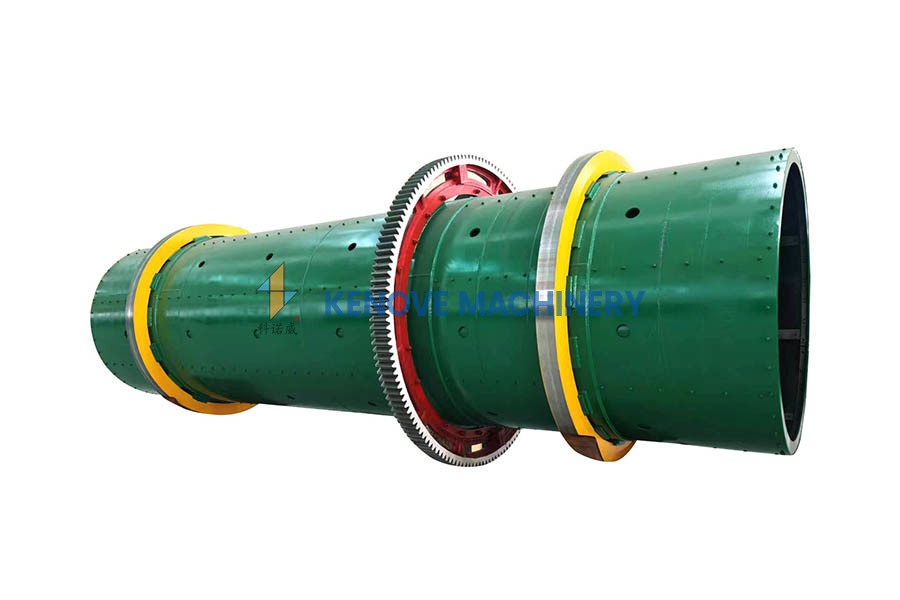The Benefits of Using a Rotary Drum Pelletizer in Modern Farming
Release time:
Aug 29,2025
The Benefits of Using a Rotary Drum Pelletizer in Modern Farming Table of Contents Introduction to Rotary Drum Pelletizers How Rotary Drum Pelletizers Work Advantages of Using Rotary Drum Pelletizers Efficiency and Productivity Cost-Effectiveness Quality of Pellets Environmental Benefits Applications in Modern Farmi
The Benefits of Using a Rotary Drum Pelletizer in Modern Farming
Table of Contents
- Introduction to Rotary Drum Pelletizers
- How Rotary Drum Pelletizers Work
- Advantages of Using Rotary Drum Pelletizers
- Applications in Modern Farming
- Case Studies
- Choosing the Right Rotary Drum Pelletizer
- Maintenance and Care
- FAQs
- Conclusion
Introduction to Rotary Drum Pelletizers
Rotary drum pelletizers are gaining significant traction in the agricultural industry as they provide a versatile and efficient solution for creating animal feed, fertilizer, and biomass pellets. These machines convert loose raw materials into compact pellets through a process that combines heat, pressure, and moisture. As modern farming seeks to optimize productivity and sustainability, understanding the benefits of rotary drum pelletizers is crucial for farmers and agricultural businesses.
How Rotary Drum Pelletizers Work
Rotary drum pelletizers operate on a straightforward mechanism. Raw materials are fed into a rotating drum, where they are subjected to a combination of mechanical pressure and thermal energy. The process involves several key steps:
1. **Feeding**: Raw materials such as grains, forage, and other organic matter are introduced into the drum.
2. **Conditioning**: The materials are mixed with steam or moisture to improve pliability, making them easier to mold into pellets.
3. **Pelletizing**: The drum's rotation compresses the conditioned materials through a die, forming pellets.
4. **Cooling**: Once formed, the pellets are cooled to harden them, ensuring durability during storage and transportation.
5. **Sieving**: The final step involves sieving to remove any fines, resulting in uniform, high-quality pellets.
This efficient process not only saves time but also enhances the overall quality of the final product.
Advantages of Using Rotary Drum Pelletizers
The integration of rotary drum pelletizers into farming operations brings numerous advantages that can significantly impact production and profitability.
Efficiency and Productivity
One of the most compelling benefits of rotary drum pelletizers is their ability to increase efficiency and productivity. By streamlining the pellet-making process, farmers can produce large volumes of pellets in a shorter time frame. The continuous operation of the drum allows for non-stop production, which is especially beneficial during peak agricultural seasons.
Cost-Effectiveness
Investing in a rotary drum pelletizer can lead to substantial cost savings in the long run. By reducing labor costs, minimizing waste, and optimizing raw material usage, farmers can achieve higher profit margins. Moreover, the ability to produce high-quality pellets on-site eliminates the need for purchasing commercial feed, further enhancing cost-effectiveness.
Quality of Pellets
The quality of pellets produced by rotary drum pelletizers is often superior to those generated by other methods. The precise control over moisture and temperature during the pelletizing process ensures a consistent product that meets nutritional standards. High-quality pellets are vital for animal health and growth, ultimately leading to increased farm productivity.
Environmental Benefits
Rotary drum pelletizers contribute positively to environmental sustainability in several ways. By converting agricultural waste into usable pellets, these machines reduce the overall waste produced by farming operations. Additionally, the efficiency of pellet production minimizes energy consumption, leading to a lower carbon footprint for farming enterprises.
Applications in Modern Farming
The applications of rotary drum pelletizers extend far beyond simple feed production. They play a pivotal role in various farming ventures:
- **Animal Feed Production**: Livestock farmers can create customized feed pellets tailored to specific nutritional needs, leading to healthier animals and improved yield.
- **Fertilizer Pellets**: The ability to produce organic fertilizer pellets from crop residues and manure enhances soil health and promotes sustainable farming practices.
- **Biomass Fuel Pellets**: As the demand for renewable energy sources rises, rotary drum pelletizers provide an efficient means of producing biomass fuel pellets from agricultural byproducts.
Case Studies
Examining real-world applications of rotary drum pelletizers sheds light on their effectiveness in various farming operations.
1. **Dairy Farm Implementation**: A mid-sized dairy farm integrated a rotary drum pelletizer into its feed production line, resulting in a 30% reduction in feed costs while maintaining optimal milk production levels. The farmer reported improved animal health and reduced waste.
2. **Organic Fertilizer Production**: An organic vegetable farm utilized a rotary drum pelletizer to convert compost into nutrient-rich fertilizer pellets. This switch not only cut down on transportation costs but also allowed the farm to sell excess fertilizer to other local farmers.
These case studies illustrate the versatility and impact of rotary drum pelletizers across diverse agricultural settings.
Choosing the Right Rotary Drum Pelletizer
Selecting the right rotary drum pelletizer is critical for maximizing benefits. Farmers should consider several factors:
- **Capacity**: Assess your production needs to choose a pelletizer that can handle the desired output.
- **Material Compatibility**: Ensure that the pelletizer can process the specific raw materials you intend to use.
- **Energy Efficiency**: Look for models that offer energy-saving features to reduce operational costs.
- **Maintenance Requirements**: Evaluate the ease of maintenance to avoid downtime and ensure longevity.
Consulting with manufacturers and industry experts can provide valuable insights into the best options available.
Maintenance and Care
Proper maintenance of rotary drum pelletizers is essential for optimal performance and longevity. Key maintenance practices include:
- **Regular Inspections**: Frequent checks of the machine components can identify potential issues before they escalate.
- **Cleaning**: Keeping the drum and feeding mechanisms clean prevents contamination and ensures efficient operation.
- **Lubrication**: Routine lubrication of moving parts reduces wear and tear, extending the life of the equipment.
- **Operator Training**: Investing in operator training enhances the understanding of machine operation and maintenance, leading to fewer errors and breakdowns.
By implementing these practices, farmers can safeguard their investment and maintain steady production levels.
FAQs
1. What types of materials can be processed with a rotary drum pelletizer?
Rotary drum pelletizers can process a variety of organic materials, including grains, forage, agricultural waste, and even manure.
2. How does the cost of rotary drum pelletizers compare to other pelletizing methods?
While the initial investment may be higher, rotary drum pelletizers are often more cost-effective in the long term due to their efficiency and low operational costs.
3. Can rotary drum pelletizers produce pellets for human consumption?
Yes, rotary drum pelletizers can be used to produce high-quality pellets suitable for human consumption, provided the raw materials meet food safety standards.
4. What is the typical lifespan of a rotary drum pelletizer?
With proper maintenance, a rotary drum pelletizer can last for several years, often exceeding a decade of reliable service.
5. Are there any safety concerns associated with using rotary drum pelletizers?
As with any machinery, safety precautions should be taken to prevent accidents. Operators should be trained in safe operating procedures and wear appropriate personal protective equipment.
Conclusion
Incorporating a rotary drum pelletizer into modern farming practices offers transformative benefits that enhance efficiency, productivity, and sustainability. From producing high-quality animal feed to creating organic fertilizer and renewable energy sources, the versatility of rotary drum pelletizers makes them an indispensable tool for forward-thinking farmers. As the agricultural landscape continues to evolve, embracing such innovative technologies will be key to meeting the demands of a growing population while ensuring environmental stewardship. The future of farming is bright, and rotary drum pelletizers are at the forefront of this evolution.
Enhancing Crop Yield: The Critical Role of Rotary Drum Granulation in Compound Fertilizer Production







